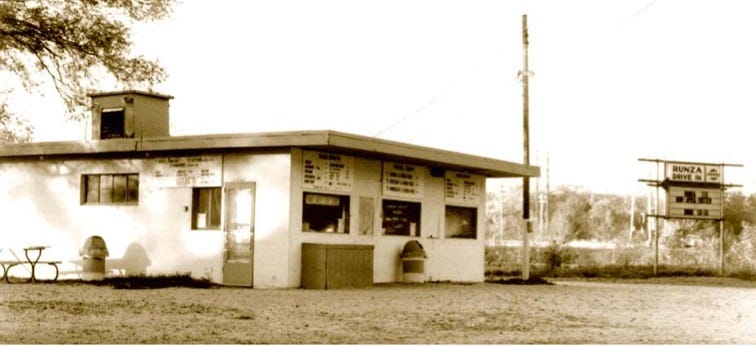Nebraska's Fast-Food Chain with Volga German Roots
History by Kara Elder
Welcome to the free version of Smart Mouth. Consider a paid subscription, buying some merch or sponsoring the newsletter with an ad. Just respond to this email. Thanks!
I’m going to Stockholm in a couple weeks. Any recommendations? -Katherine
Please enjoy the article below by Kara Elder.
Nebraska's Fast-Food Chain with Volga German Roots
By Kara Elder
Whether you tuck into one at a Cornhusker football game or from one of 88 locations in Nebraska, Kansas, Iowa and Colorado, the Runza sandwich, a savory stuffed bun from the fast-food chain of the same name, is pure Nebraska. To learn how it achieved its cult status, though, look to the 1700s. And Russia.
In 1762 and 1763, Catherine the Great invited foreign colonists to populate the expanding Russian empire. The offer especially tempted Germans, 30,000 of whom left their war-torn homes with the promise of military service exemption, the right to maintain their language and religion, and a 30-year tax exemption. Known as German Russians or Volga Germans, they farmed the expansive steppe along the Volga River. German Russians kept their food traditions, too, while incorporating techniques from their new climate.
One of those foods became the foundation for Runza. Taking a cue from the Russian pirog, a savory, stuffed pie, German Russians created the pocket-sized bierock, known also as krautenruns, cabbage pies, kraut bierock, and Runzas. Russian savory pies abound, with the pirog — derived from the word pir, meaning feast — leading the pack. (Don’t confuse pirogi — plural for pirog — with pierogi, the Polish dumplings, or pirozhki, the plural of pirozhok, the diminutive, handheld version of a pirog.)
“Runzas were made for the men to take out into the fields to eat, so they wouldn’t have to come back into town for the meals,” says Pam Wurst, a member of the American Historical Society of Germans from Russia, based in Lincoln, Neb. “The Russian versions were filled with potatoes and onions, mostly,” she explains. “The Germans added cabbage and meat to them. Most of the time they left the potatoes out.”
100 years later, as Russian nationalism grew, new legislation reversed Catherine’s promises. Many of the Volga Germans immigrated to the United States, which was seeking to colonize land gained during its own bloody expansion. Several settled in Nebraska, including the family of Sarah “Sally” (Brening) Everett, born in Sutton in 1912. She grew up making savory pies filled with beef, cabbage, onions, and spices, so in 1949, when it was hard to find jobs after World War II, Everett coined the final spelling and pronunciation of the sandwiches and trademarked the Runza name, opening her first restaurant — a car hop stand — with her brother and brother-in-law.
“Our best guess is there was a German word which was close, and she changed it enough to be able to be trademarked,” says Becky Perrett, Runza’s director of marketing. (Perhaps it was runsa, a low German word meaning “bun shape.”)
“To be a female entrepreneur in 1949,” says Perrett, “She was ahead of her time.”
The company is still run by the Everett family, with Sally’s grandson, Donald Everett, Jr., serving as president. Menus include other typical fast-food fare — offerings for those who don’t love the stuffed sandwiches — along with several Runza variations and the good ol’ original. The simple bun represents centuries of immigration across multiple countries, distilled into something so uniquely American: a restaurant franchise.
Sources:
A History of Russia: People, Legends, Events, Forces by Catherine Evtuhov, David Goldfrank, Richard Stites, and Lindsey Hughes (Houghton Mifflin Company, 2004).
Please to the Table: The Russian Cookbook by Anya Von Brezen and John Welchman (Workman, 1990).
Read about another American hand pie here.
More Food Media:
Anthony Bourdain’s disdain for popular Paris. (Thank you Aaron Billard!)
If you liked the newsletter today, please forward it to someone who’d enjoy it, and tap the heart icon above or below, which will help me reach more readers. I appreciate your help, y’all!
This newsletter is edited by Katherine Spiers, host of the podcast Smart Mouth.
A TableCakes Production.
Want to contribute? Here are the submission guidelines.







I am a Volga German descendant! Cabbage buns are such a treat, and they take a lot of work, so whenever my mom makes them, I really savor it. I like to kinda let it open a bit as I am eating it so I can pour Tapatio inside like a little hot pocket.